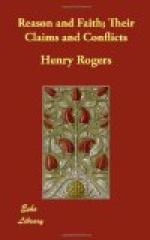____
* Foxton’s last chapter, passim, from some expressions one would almost imagine that our author himself aspired to be, if not the Messiah, at least the Elias, of this new dispensation. We fear, however, that this ‘vox clamantis’ would reverse the Baptist’s proclamation, and would cry, ‘The straight shall be made crooked. and the plain places rough.’ + We fear that many young minds in our day are exposed to the danger of falling into one or other of the prevailing forms of unbelief, and especially into that of pantheistic mysticism—from rashly meditating in the cloudy regions of German philosophy—on difficulties which would seem beyond the limits of human reason, but which that philosophy too often promises to solve—with what success we may see from the rapid succession and impenetrable obscurities of its various systems. Alas! when will men learn that one of the highest achievements of philosophy is to know when it is vain to philosophise. When the obscure principles of these most uncouth philosophies, expressed, we verily believe, in the darkest language ever used by civilised man, are applied to the solution of the problems of theology and ethics, no wonder that the natural consequence, as well as just retribution, of such temerity is a plunge into tenfold night. Systems of German philosophy may perhaps be advantageously studied by those who are mature enough to study them; but that they have an incomparable power of intoxicating the intellect of the young aspirant to their mysteries, is, we think, undeniable. They are producing the effect just now in a multitude of our juveniles, who are beclouding themselves in the vain attempt to comprehend ill-translated fragments of ill-understood philosophies, (executed in a sort of Anglicised-German, or Germanised-English, we know not which to call it, but certainly neither German nor English,) from the perusal of which they carry away nothing but some very obscure terms, on which they themselves have superinduced a very vague meaning. These terms you in vain implore them to define; or, if they define them, they define them in terms which as much need definition. Heartily do we wish that Socrates would reappear amongst us, to exercise his accoucheur’s art on these hapless Theaetetuses and Menos of our day! Many such youths might no doubt reply at first to the sarcastic Querist, (who might gently complain of a slight cloudiness in their speculations.) that the truths they uttered were too profound for ordinary reasoners. We may easily imagine how Socrates would have dealt with such assumptions. His reply would be rather more severe than that of Mackintosh to Coleridge in a somewhat similar case; namely, that if a notion cannot be made clear to persons who have spent the better part of their days in resolving the difficulties of metaphysics and philosophy, and who are conscious that they are not destitute of patience for the effort requisite to understand them, it may suggest a doubt whether




